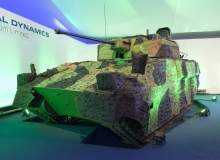

The new armoured vehicles – called the Scout SV – will be the "eyes and ears" of the British Army on the battlefields of the future. The Scout SV represents the future of Armoured Fighting Vehicles (AFV) and will give the British Army world-class intelligence, surveillance, target acquisition and recognition (ISTAR) capabilities as well as protection against threats like IEDs.
Speaking at a pre-NATO Summit conference at the Royal United Services institute today, defence secretary Michael Fallon said the Scout purchase was the biggest armoured vehicle spend in a generation and will boost the capabilities of the British Army. "It forms part of a wider dynamic in which defence incubates innovation that supports the wider economy," Fallon said.
"We are making a robust and public pledge on defence spending. We must be serious about providing a full-spectrum arsenal and target areas where defence spending has had a shortfall," he added.
Soldiers’ needs will directly drive plans for new and overhauled armoured vehicles in support of Army 2020.
The vehicle will allow soldiers to conduct sustained, expeditionary operations on the modern battlefield and fix on enemy soldiers and tanks using advanced sensors and on-board network-enabled systems. The Scout, which will come in six variants, will be manufactured in South Wales with deliveries due to begin in 2017 and finish in 2024.
One variant will also feature an advanced 40mm cannon, called the CT40, which is being developed as part of an Anglo-French initiative.
Prime Minister David Cameron said he was "delighted" he could announce the deal on the eve of the NATO summit. "These new vehicles are testament to the world class engineering skills in South Wales and across the UK, helping to create the Army’s first fully digitalised armoured vehicles."

Britain at the forefront of the global arms race
Cameron said Britain’s investment in new capabilities like the Scout SV would ensure the country could deal with emerging threats and "stay at the forefront of the global race".
The multi-billion dollar contract has been awarded to Wales-based General Dynamics UK and, according to the Ministry of Defence, it will secure over 1,300 engineering jobs across the UK. Much of the work on the vehicle has been carried out at General Dynamics UK’s AFV design and engineering centre in Oakdale, South Wales. The contract will also secure around 300 jobs at the Oakdale site.
The Scout SV is the first British armoured vehicle to be designed since the conflicts in Iraq and Afghansitan so protection against IEDs has been a key requirement.
"There hasn’t been anything like this for a long, long time and it is a very exciting vehicle because it has been designed in the aftermath of Iraq and Afghanistan so it is highly survivable…but also it is equipped with all of the technology that has emerged from the needs of those conflicts," Eddie Allen, Business Development Director at General Dynamics UK recently told army-technology.
Rumours had been circulating that the MOD was trying to speed up the approval of the manufacturing phase, which was planned for later this year or even 2015. Today’s contract announcement suggests this rumour was true and the negotiations between the MOD and General Dynamics UK have been successful. This week’s NATO Summit may have also played a role in expediting the contract announcement.
At a time when some NATO members defence budget’s are in decline, the UK’s announcement is designed to show leadership in difficult times. It is also a signal to countries like Russia that Britain is still serious about maintaining effective military capabilities for land warfare. Those sharing a border with Russia, especially NATO members in Eastern Europe, might take some comfort from today’s announcement.
Follow Grant Turnbull on Google+


.gif)

